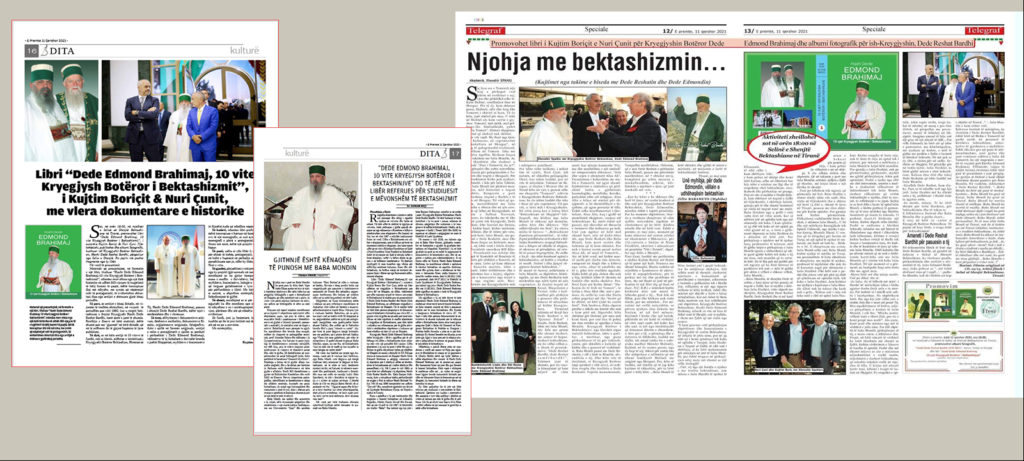The book “Dede Edmond Brahimaj, 10 years of the World Leader of Bektashism”, by Kujtim Borici & Nuri Cuni, a book with documentary and historical values.
Today, at 18:00, in the premises of the Bektashi Holy See in Tirana, was promoted the book “Dede Edmond Brahimaj, 10 years World Leader of Bektashism”, by Kujtim Boriçi & Nuri Çuni. At the same time, the photo album was published, dedicated to the former Bektashi World Leader, Haxhi Dede Reshat Bardhi, prepared by the Holy See. We are giving excerpts from this book below.

Instead of presentation
The material we present, in the format of a book, entitled “Haxhi Dede Edmond Brahimaj-10 years World Leader of Bektashism”, although takes cause by a historical date in the 800-year journey of this peaceful faith, is conceived somewhat differently, with the aim that through the role of the protagonist, to be briefly evidenced some of the achievements marked during this period.
First, because the achievements of this decade, following the old centuries tradition, especially of the period after 1990, when Bektashism was revived and led by Greandfather Haxhi Dede Reshat Bardhi, have been and are numerous. The ranking of some in this material is very little with the ‘traces’ in this decade, which in the future will find other publishing spaces.
Secondly, because in these achievements of the last 10 years, the role as a clergyman, patriot and intellectual of the Bektashi World Leader, His Grace, Haxhi Dede Edmond Brahimaj, successor of the saint Dede Reshat Bardhi, is extremely important and appreciated.
Third, the use of archival documents, media evidence, film documents, original recordings, photographs, bringing them in the original form, the achievements and the role of protagonist bring as a joint product of Dede Edmond Brahimaj, his brothers father and dervishes inside and outside Albania, myhibs and simple believers everywhere in the world.
Fourth, although the book is professionally conceived and compiled according to the criteria of a monograph, it is not intended to be the complete protagonist monograph, but, rather, it is a project that remains open.
Fifth, just like any book (of any kind), due to the time, the protagonist, the events in time and space in the face of the challenges foreseen or not, this book also has its own specifics.
Sixth, the exclusion of the protagonist himself from this project (normal thing in such cases), we think has found compensation in the large mass of dervishes, fathers, myhibs, believers, numerous colleagues who showed their concrete readiness for the completion of the book. On this occasion, we, as authors, express our gratitude and thanks to all.
Seventh, we think that for every book, of course, there are different opinions or objections and we understand them. The time that comes, completes what may not have been evidenced.
Finally, it is you believers, readers or whoever will be the most accurate critics of what we are serving.
With gratitude,
Authors:
Nuri ÇUNI
Kujtim BORIÇI
Short presentation of the book
Dr. Dorian KOÇI
The spiritual resurrection of people is a monopath and a narrow path of self-knowledge and the auspicious world. Almost the entire Albanian people have gone through this difficult path of rediscovering themselves since the violent severance of centuries ago connections between Albanians and belief in God, when in 1967 religious institutions in the country were closed. The path of Bektashism with the path of Albanianism are connected from an early age in the Albanian collective memory. They have taken the path in the years of the National Renaissance in the words of the National Poet Naim Frashëri that the Fathers should lead with holy words the struggle of the Albanian freedom, the poor to become friends in the joy and sorrow of the nationals. Loved ones (myhypes) not to be spared from death for the homeland.
This cultural, religious and patriotism symbiosis has taken root in the Albanian territories, giving one of the physiognomies of Albanian patriotism.
The book “Dede Edmond Brahimaj, 10 years World Leader of the Bektashis”, by Kujtim Boriçi and Nuri Çuni, is a travel book on the revival of Bektashism after the 90’s in Albania, in the challenges, difficulties but also highlighting the universal values of Bektashism embodied in the personalities of Haxhi Dede Reshat Bardhi and Haxhi Dede Edmond Brahimaj, who led the revival of Bektashism in Albania.
At the same time, in this book, through the documented efforts of the Bektashi fathers after the 90s, all those who have contributed to this great spiritual edifice of the revival of Bektashism find themselves, as the book is full of information about all the important spiritual and cultural activities that have taken place in these 10 years in Albania.
Grandfather Haxhi Dede Edmond Brahimaj is the 39th grandfather elected to lead the path of Bektashism carrying over an 800-year period. His spiritual path has not been easy and it reflects all the changes of the time that took place in Albania in the middle of the twentieth century. Immediately after the fall of communism in Albania, Haxhi Dede Edmond Brahimaj responded to his spiritual vocation to serve the shining path of Bektashism that his predecessors had served. On January 2, 1992, he took hand on his spiritual leader, Haxhi Dede Reshat Bardhi and Baba Barjam Mahmutaj, thus finally joining the path of the enlightened Piri Haxhi Bektash Veliu. On May 16, 1996, he was consecrated with the order “Dervish” and was immediately charged with duty in the Bektashi Quarter of Korça, in the well-known Turan Tekke.
His tireless work for the continuity and revival of the Bektashi faith in Librazhd, Pogradec, Mokër, Korçë, Devoll and Kavaja, led to the decree on April 13, 1997, with the title “Father”. After passing through this life of father Bajram Mahmutaj, he was appointed as the first deputy of the Bektashi World Leader, Haxhi Dede Reshat Bardhi. In this high function, his contribution has been invaluable, especially in the conception, preparation and realization of the next three congresses of Bektashism. Moreover, in the last two congresses (2000 and 2005 in Tirana) he reported as a responsible person on behalf of the High Parental Council.
In March 2006, with the death of Father Tahir Emini, he was also appointed as the grandfather of the Bektashi Quarter in Macedonia. His contribution to this Bektashi Quarter has been both in terms of organizing the communities of believers there, and in terms of international recognition. In both Korça and Tetovo, Haxhi Baba Edmond Brahimaj, has manifested the outstanding qualities of the Bektashi cleric in doctrinal, moral and civic terms, becoming a factor of religious tolerance between other faiths. By extra decision, dated June 11, 2011 ( protocol no.160, dated on July 04, 2011) of the High Parental Council of the World Headquarter of Bektashi Community, after the death of Haxhi Dede Reshat Bardhi on June 11, 2011, Dede Edmond Brahimaj was elected to the high post of World Bektashi Grandfather.
With his election to this high spiritual duty, Haxhi Dede Edmond Brahimaj has embodied the highest values of the Bektashi faith by reviving, bringing to light and following the best Bektashi traditions and the spirit of the Bektashi congresses of the 1920s. In the pages of this book, through the documentation of numerous cultural activities to illuminate the path of Bektashism, it seems as if the words of Father Ali Tomorri have been reflected in the Bektashi Congress of Prishta that the Congress of Prishta laid the foundation of new life for the Bektashis. This foundation was strengthened with knowledge, not with anything else, the other laws are to maintain the likable situation today in the natural liberal group of Bektashis.
The unlimited support given to life in the great march for peace in Paris after the painful events of the murder of 12 journalists of Charlie Hebdo is another proof of the spiritual path and vision of Haxhi Dede Edmond Brahimaj to promote peace and religious harmony which are also the cornerstone of the Bektashi faith. We see this work embodied even today, not only in the legal regulations within the Bektashi community but also in the religious tolerance demonstrated today in Albania, where the Bektashi community has made a valuable contribution.
This book will undoubtedly be a reference book for later scholars of Bektashism. Careful weeding of materials and their presentation to the public serves not only for today but above all for the future. Whoever dives between his pages begins to feel like a traveler in a wide monopath of knowledge as it is the Bektashi path.
